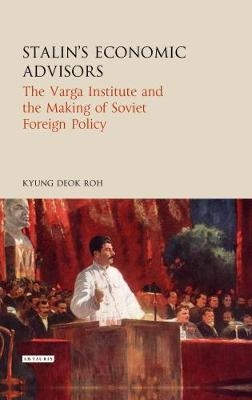
Stalin's Economic Advisors
I.B. Tauris (Verlag)
978-1-78453-693-0 (ISBN)
Soviet foreign policy in the Stalin era is commonly assumed to have been a direct product of either Marxist ideology or the leader's whims. Both assumptions, however, oversimplify the complex and subtle factors involved in its creation and implementation. Kyung-Deok Roh provides an alternative, more nuanced, explanation and demonstrates the key role played by Stalin's economic advisors. The so-called 'Varga Institute' , a 'think tank' led by Evgenii Varga, developed a unique scholarly discourse on the capitalist economy and international politics, based on an amalgam of Marxist economics and, notably, the work of American economist W. E. Mitchell. The institute's scholarship, which suggested the resilience, adaptability and stability of the capitalist economy, created the discursive space within which decisions were made, and influenced Stalin to move increasingly from aggressive strategies towards more cautious international policies. Roh's account, the first comprehensive study of this pivotal group, demonstrates the many complex ways that Soviet foreign policy was created and sheds new light onto the controversial relationship between Soviet academia and the party.
Based on extensive archival research into previously untouched material, Stalin's Economic Advisors is essential reading for all researchers seeking to add nuance to their conception of Stalinist foreign policy, economic thought and politics.
Kyung Deok Roh is Assistant Professor of History at the Ewha Womans University and has also taught at GIST College. He received his PhD from the University of Chicago and has contributed to peer-reviewed journals on Stalinism and Cold War history.
IntroductionChapter 1: Between Science and Propaganda: Institutional Development of the Institute of World Economy and World Politics, 1927-1953 Chapter 2: An Academic Institute under Totalitarian Control? The Internal and External Operation of the Institute of World Economy and World Politics, 1927-1947Chapter 3: Combining Marxism and W. E. Mitchell's Business Cycle Theory: The Theoretical Basis of the Varga Group, 1927-1953 Chapter 4: "A Concrete-Historical Analysis": The Varga Group's Discourse on World Economy and Its Crisis, 1927-1953 Chapter 5: "Too Old, Too Foreign": Rethinking the Varga Controversy and the End of the Institute of World Economy and World Politics, 1941-1953Conclusion
| Erscheinungsdatum | 18.04.2018 |
|---|---|
| Reihe/Serie | International Library of Twentieth Century History |
| Zusatzinfo | 10 integrated black and white illustrations |
| Sprache | englisch |
| Maße | 138 x 216 mm |
| Themenwelt | Geschichte ► Teilgebiete der Geschichte ► Wirtschaftsgeschichte |
| Sozialwissenschaften ► Politik / Verwaltung ► Europäische / Internationale Politik | |
| Wirtschaft ► Allgemeines / Lexika | |
| Wirtschaft ► Volkswirtschaftslehre ► Makroökonomie | |
| ISBN-10 | 1-78453-693-8 / 1784536938 |
| ISBN-13 | 978-1-78453-693-0 / 9781784536930 |
| Zustand | Neuware |
| Haben Sie eine Frage zum Produkt? |
aus dem Bereich


